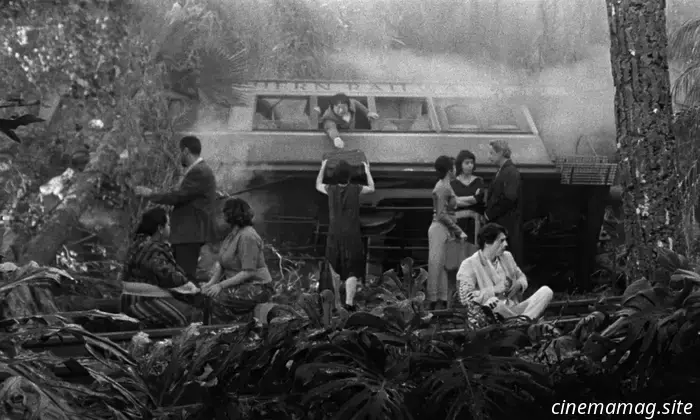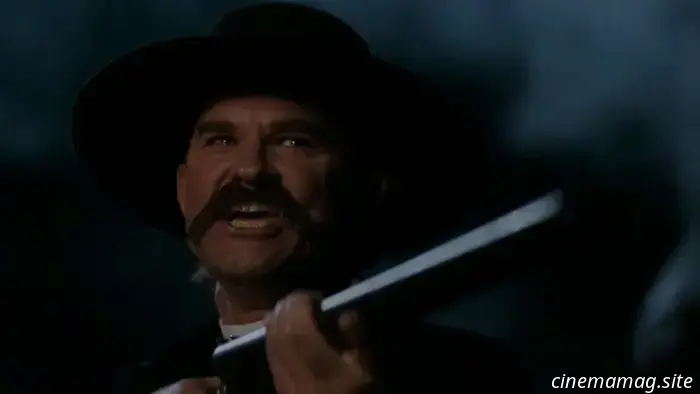
Grand Tour Review: A Captivating Comeback for Miguel Gomes
Note: This review was initially published as part of our coverage of Cannes 2024. Grand Tour hits theaters on March 28, distributed by MUBI.
If Chris Marker and Preston Sturges had ever collaborated on a film, it might resemble Grand Tour, an expansive narrative that transitions from Rangoon to Manila, passing through Bangkok, Saigon, and Osaka, as it intertwines the lives of two vastly different lovers leading to a pivotal reunion. The stowaways embody quintessential Sturgian characters: the sophisticated man on the run, and the bold woman determined to find him. Their scenes are set in 1917 and filmed in a classic studio style, yet they unfold within a modern travel narrative––as if we are following not just their epic love story, but also a director's own travels.
Grand Tour, which infused much-needed enchantment into this year’s Cannes Film Festival lineup, is helmed by the talented Miguel Gomes, the Portuguese director known for works like The Tsugua Diaries (an enjoyable COVID-themed film from 2021), Arabian Nights (his ambitious 2015 trilogy), and Tabu (a breakout film from 2012 that shares the most thematic elements with Grand Tour). We return to that film’s black-and-white colonial setting, this time enhanced by a documentary framing device (often in color, but not exclusively, and occasionally featuring a captivating mix of both) that provides a unique experimental touch. By referencing the constructed nature of the narrative being presented while simultaneously heightening the overall sense of wonder (with visuals from three credited cinematographers: Gui Liang, Rui Poças, and the renowned Sayombhu Mukdeeprom), the director crafts a vibrant cultural mosaic filled with enchanting puppet shows, rich street scenes, and enigmatic landscapes.
Divided into two sequential accounts, the first follows Gonçalo Waddington’s charming Edward––an adventurer donned in white linens, straddling the line between a David Lean film hero and the Kinski character from Fitzcarraldo. Initially, he waits for his fiancée, Molly (Crista Alfaiate), but hesitates and boards a train to Bangkok. Everything you need to know about Edward––and indeed, about the film as a whole––can be gathered from his reaction after his train derails in the jungle: emerging unscathed from the wreckage, he gazes at the rising sun and remarks on “a beautiful morning” before settling down to make a sketch.
Edward’s odyssey leads him to an event for the Thai crown prince, an elder man in Japan, and an expatriate in China who has developed an affinity for opium. The narrative sharpens its focus after Edward disappears and Molly arrives midway through. Molly is the more outgoing and captivating character, possessing a somewhat annoying laugh and a recurring issue with fainting that hints at potential trouble. She retraces Edward’s journey, meeting a dashing cousin, a wealthy admirer (Cláudio da Silva), and making a new friend (Lang Khê Tran).
Gomes’ choice to concentrate on English characters (without translating all the dialogue they don’t understand) might be seen as risky; credit goes to the director and his team for creating something so rich and endearing. One reason for its success is the careful use of language throughout: while Molly, Edward, and many of their contemporaries are ostensibly British, they are portrayed by Portuguese actors who converse in their native language; moreover, Gomes alters the narration's language according to the setting, granting each section its own unique cadence and character. If this were a modernized or loosely adapted version of a true colonial-era narrative, it might invite different criticisms, but it is in fact an original screenplay by Gomes, Maureen Fazendeiro, Telmo Churro, and Mariana Ricardo––collectively referred to in the credits as the film's “central committee.” (The inclusion of the title in multiple languages on the poster also likely contributes positively.)
In the end, everything comes together wonderfully, creating a film that stimulates the curious mind and adventurous spirit. A panda improbably perched on a distant bamboo tree; bubbles inexplicably showering a grave; the ethereal dance of a puppeteer troupe as their mermaid marionette glides. Ultimately, it’s moments like these that remain etched in memory, reminding us of the power of cinema and reaffirming the value of prestigious venues like Cannes.
Grand Tour premiered at the 2024 Cannes Film Festival and is set to be released on March 28 by MUBI.

Other articles
 Tombstone is arriving in 4K Ultra HD, and it's bringing hell along with it.
Elevation has revealed that George P. Cosmatos' iconic 1993 western, Tombstone, will be released on 4K Ultra HD, accompanied by a limited edition SteelBook in April. Take a look at the cover art and further details here… Justice approaches as the legendary epic action-adventure, Tombstone, returns on 4K Ultra HD.
Tombstone is arriving in 4K Ultra HD, and it's bringing hell along with it.
Elevation has revealed that George P. Cosmatos' iconic 1993 western, Tombstone, will be released on 4K Ultra HD, accompanied by a limited edition SteelBook in April. Take a look at the cover art and further details here… Justice approaches as the legendary epic action-adventure, Tombstone, returns on 4K Ultra HD.
-Movie-Review.jpg) The Penguin Lessons (2025) - Film Review
The Penguin Lessons, 2025. Directed by Peter Cattaneo. Featuring Steve Coogan, Jonathan Pryce, Vivian El Jaber, Björn Gustafsson, Alfonsina Carrocio, David Herrero, Micaela Breque, Tomás Pozzi, Ramiro Blas, and Juan Barreiro. Also starring Gera Maleh, Brendan McNamee, Joaquín Lopez, Miguel Alejandro Serrano, Hugo Fuertes, Nicanor Fernandez, Aimar Miranda, and Florencia Nocetti. SYNOPSIS: In 1976, as Argentina plunges into […]
The Penguin Lessons (2025) - Film Review
The Penguin Lessons, 2025. Directed by Peter Cattaneo. Featuring Steve Coogan, Jonathan Pryce, Vivian El Jaber, Björn Gustafsson, Alfonsina Carrocio, David Herrero, Micaela Breque, Tomás Pozzi, Ramiro Blas, and Juan Barreiro. Also starring Gera Maleh, Brendan McNamee, Joaquín Lopez, Miguel Alejandro Serrano, Hugo Fuertes, Nicanor Fernandez, Aimar Miranda, and Florencia Nocetti. SYNOPSIS: In 1976, as Argentina plunges into […]
 The Emperor of Light makes his debut in The Seven Deadly Sins: IDLE Adventure with the latest update.
Netmarble has launched a new update for the idle RPG The Seven Deadly Sins: IDLE Adventure, which introduces a new character – the Emperor of Light Escanor, along with a special event and improved game content. In this most recent update for the game inspired by the globally acclaimed manga and anime 'The Seven Deadly Sins', the INT-based DPS Emperor […]
The Emperor of Light makes his debut in The Seven Deadly Sins: IDLE Adventure with the latest update.
Netmarble has launched a new update for the idle RPG The Seven Deadly Sins: IDLE Adventure, which introduces a new character – the Emperor of Light Escanor, along with a special event and improved game content. In this most recent update for the game inspired by the globally acclaimed manga and anime 'The Seven Deadly Sins', the INT-based DPS Emperor […]
 Brendan Fraser's Comeback in Hollywood: From The Mummy to Contemporary Adventure Movies - MovieMaker Magazine
Brendan Fraser was a prominent figure in Hollywood throughout the 90s, and his recent return to fame has been equally surprising and welcomed.
Brendan Fraser's Comeback in Hollywood: From The Mummy to Contemporary Adventure Movies - MovieMaker Magazine
Brendan Fraser was a prominent figure in Hollywood throughout the 90s, and his recent return to fame has been equally surprising and welcomed.
 15 Unanticipated Movie Deaths
These movie deaths caught everyone off guard. Spoilers are coming, of course.
15 Unanticipated Movie Deaths
These movie deaths caught everyone off guard. Spoilers are coming, of course.
 The Surge of Irish Entertainment on Leading Streaming Platforms - MovieMaker Magazine
Ireland is the residence of several prominent figures in the film industry, such as Paul Mescal, Cillian Murphy, and Saoirse Ronan. Additionally, Ireland is emerging as a hub for
The Surge of Irish Entertainment on Leading Streaming Platforms - MovieMaker Magazine
Ireland is the residence of several prominent figures in the film industry, such as Paul Mescal, Cillian Murphy, and Saoirse Ronan. Additionally, Ireland is emerging as a hub for
Grand Tour Review: A Captivating Comeback for Miguel Gomes
Note: This review was initially published as part of our coverage of Cannes 2024. Grand Tour will be released in theaters on March 28 by MUBI. If Chris Marker and Preston Sturges collaborated on a film, it might resemble Grand Tour, an expansive narrative that travels from Rangoon to Manila, passing through Bangkok, Saigon, and
